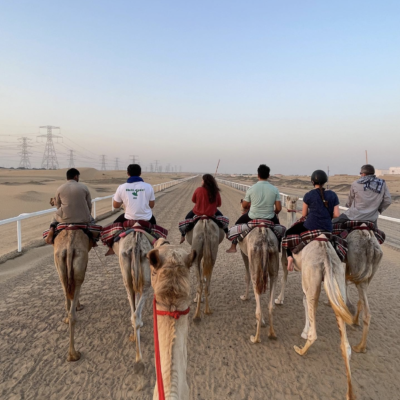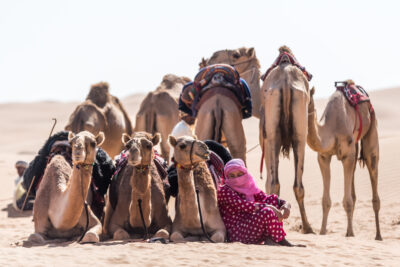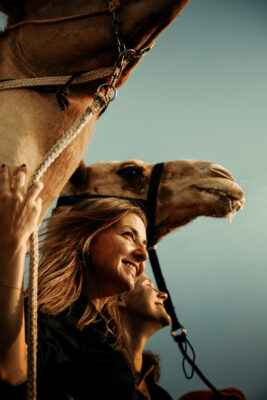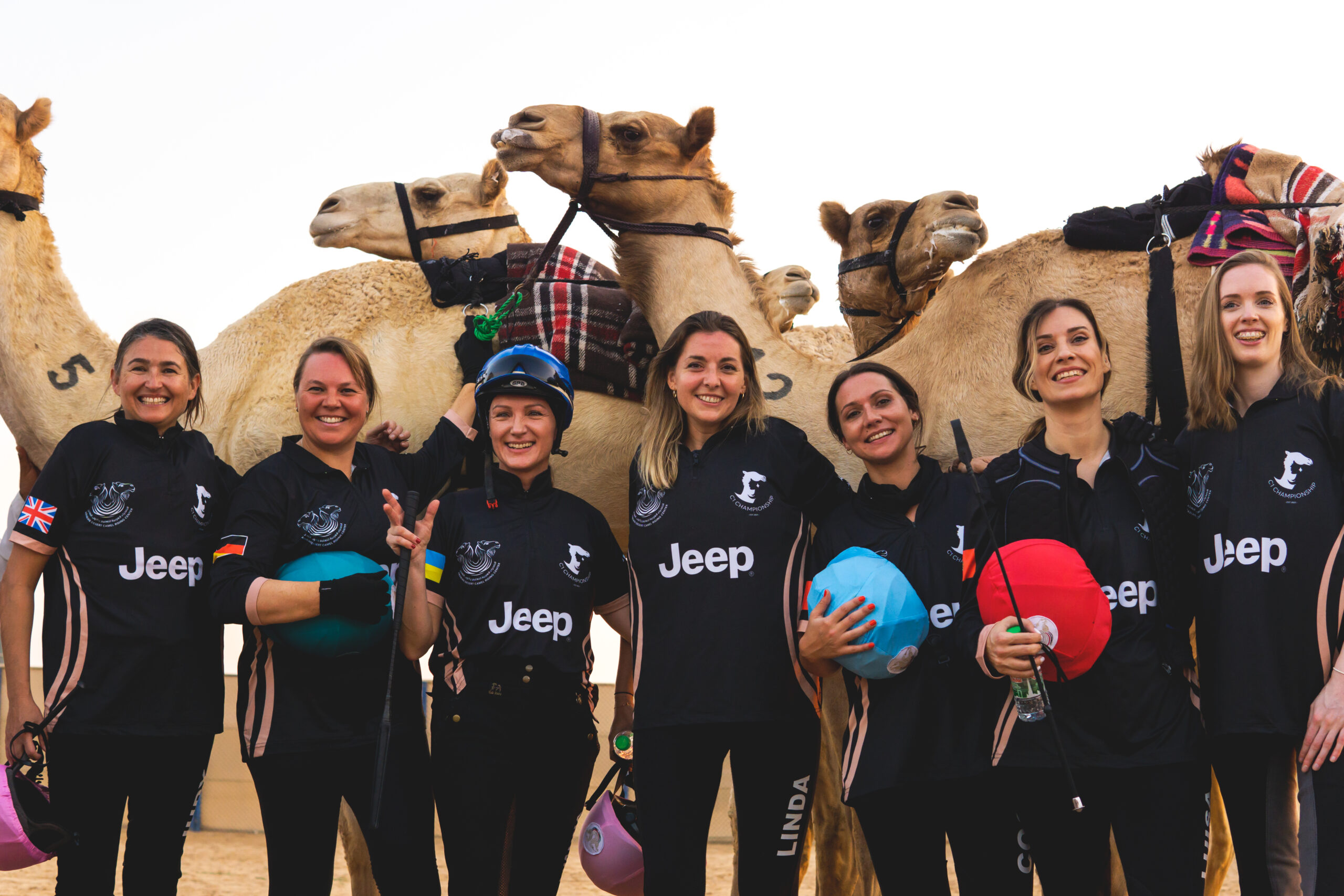Linda Krockenberger is a German woman who studied hotel management and was steadily climbing the career ladder in Dubai. After she fell in love with camel riding, she decided to pursue her passion full-time, ultimately co-founding the UAE’s first camel riding school. This was enough to pique my interest and want to share her story!
Get ready for an adventurous journey.
An entrepreneurial odyssey

ADCRC shool students
Linda initially learned camel riding through an Emirati government institution that organises annual camel treks. “But once you completed this annual event, you were meant to just go on with your life. When my friends asked if they could come, I always had to say no, because they were not part of this programme. That’s when I noticed there’s a gap, and no facilities or institutions,” she said. A Covid-induced career break and her eagerness to make this experience accessible to the general public led her to create ADCRC, the UAE’s first licensed camel riding school, in 2021.
Overcoming obstacles

Linda during the Empty Quarter Trip, 2019
Linda started looking for an Emirati partner willing to provide the facilities and the camels for her school. This was a quite struggle, and after many fruitless conversations, she almost gave up on the idea. However, her efforts paid off and she found a business partner who shared her vision. “Through some lucky circumstances, I met my current business partner. He saw the vision, maybe more than I did. When I laid out the pieces, he immediately said: it’s like a horse stable, but for camels!”, she explained. Together they set up the school with three camels, and now have 13. They plan to expand further and aim to have around 15, so as to accommodate more riders and allow for proper rotation and rest for the animals.
Camels: resilience par excellence

Some of ADCRC’s proteges
Camels have the unique ability to adapt to deal with scarcity and extreme desert conditions. They are less sensitive to changes in feed and are known for their high threshold of pain. They can also absorb and store water in their bodies without any adverse effects. Highly emotionally intelligent beings, they are highly perceptive and can mirror the emotions of their riders, relieving their stress level. “When you work or are engaging with animals, you start focusing on them. When you sit on a camel, you just look at his ears. That takes away a lot of what works in your head all the time,” Linda said. Camels at ADCRC are primarily male, as they are often retired from racing and therefore more readily available, while females are kept for breeding and reproduction.
Building a team of desert-riders

4km race in AlUla, March 2023
Linda started a race programme at ADCRC in response to the enthusiasm of several women who wanted to participate in camel racing. “We had some very adventurous women who said: “we see camels running races, we should try and run with them!”. It was then up to us as a facility to enable this to happen. The first racing series was kicked off in October 2021, just ten months after we opened the school,” she said. The idea progressively spread, and today the team is composed of eight women. They participated in the Crown Prince Festival in June in Al Taif, Saudi Arabia, where two of her riders secured 1st and 3rd place, and just participated in the C1 Championship in Dubai.
It’s not all oases and blue skies

Wahiba Sands, Oman
As a European woman entering this field, Linda was exposing herself to potential criticism, and potentially cultural appropriation. She ensured that her intentions were genuine and respectful, emphasising both the athletic and hobby-centred nature of the school. “Camels are part of Bedouin culture, but they can also be a hobby and a companion for someone from Germany,” she said. She also received support from male allies, which helped overcome some of the traditional gender dynamics present in the industry. “At the race in Saudi Arabia, we were 13 women, and I don’t know how many hundreds of men. But I felt there was so much support from men to make this happen. I don’t want to hide that fact. I have an Emirati male partner, he helps to make these things work,” she explained.

Linda of Arabia
Sands of wisdom
When asked which resource, whether personal or professional, she could share, she recommended “The Mettleset” a podcast highlighting stories of tenacity, courage and mettle from athletes in the Middle East and beyond, notably female ones that do not have much media exposure. She also mentioned “The Alchemist”, by Paulo Coelho. “I’ve read it this time with a perspective of a small business, which was quite interesting. There’s a lot of learnings that were a good reflection of how to deal with adversity, but also creativity and how your inner passion can help get you further, also in a business setup,” she explained.
Mapping the desert
Among her many projects, Linda aims to expand and replicate her camel riding school model in other locations. She consults on camel-related topics and hopes to advocate for a better understanding and appreciation of camels. “There’s a lack of understanding from an audience that is not connected to the camel. Hotels, for example, having camels, or tourist attractions where I feel like the camel is widely misunderstood. I hope to be an advocate in well-being and help its reputation change. I truly believe that they will play a much bigger role in the future, because of the changing climate as well,” she concluded.
Just as camels navigate sand dunes, Linda continues to carve a welcome path to inclusion for women in camel racing, combining animal and human well-being.
Linda Krockenberger’s school website: adcrc.me, and Instagram
This interview has been edited for length and clarity.
Cover picture: Linda (centre) and her female camel racing team © Linda Krockenberger
All pictures © Linda Krockenberger

